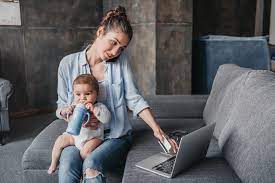– Almost half of single mothers are now not reaching the minimum earnings threshold for automatic enrolment into a workplace pension –
- 43% of single mothers – around 400,000 women – are currently locked out of automatic enrolment
- This is an increase of around 100,000 since the start of the pandemic
- The average income for a single mother has fallen by £1,400 since the start of the pandemic to £16,890, 39% lower than the UK average of £27,376
- The average private pension savings for single mothers is £18,300, compared to £57,500 for the average woman and £203,200 for the average man
- Rising childcare costs, lower levels of employment and reductions in earnings caused by COVID-19 are creating significant barriers to pension saving
Friday, 19th March 2021. New research conducted by NOW: Pensions, the pension provider for 1.8 million people and the Pensions Policy Institute (PPI) has found that almost half of single mothers are now ineligible for automatic enrolment into a workplace pension. Due to the COVID-19 crisis, around 400,000 single mothers are currently locked out of workplace pension saving, up by a third on last March’s figures. The research highlights how coronavirus has further exacerbated the inequality that single mothers face when it comes to pension saving, ahead of National Single Parents Day on Sunday 21st March.
Whilst 31% of single mothers were not reaching the £10,000 auto-enrolment threshold before the pandemic, this has risen to almost half (43%), leading around an additional 100,000 women to miss out on employer contributions.
![NP317_Single_mum_Infobites-02[1].png](https://cdn.roxhillmedia.com/production/email/attachment/850001_860000/d13155fb28222b65be9b42e05b2d0a7e9f62b2cc.png)
The continued economic impact of the COVID-19 crisis has led to an estimated 4% rise in childcare costs[1], creating additional financial pressures and substantial barriers to later life saving for many.
Average annual income for single mothers has also shrunk from £18,290 to £16,890, dropping by £1,400. Around a quarter of single mothers have seen a reduction in earnings within the last year, and those who were furloughed saw auto enrolment contributions reduce by an average of 25%.
COVID-19 and childcare
Recent lockdowns have made it harder for single mothers to work as they juggle children’s schoolwork, household chores and employment responsibilities. According to The Office of National Statistics (ONS), 67% of women took on additional home-schooling responsibilities between January and February this year, with 99% of women reporting to have spent more time looking after their children than men.
A survey conducted by Trade Union Congress found that 18% of mothers had been forced to reduce their working hours and around 7% were taking unpaid leave from work and receiving no income – two situations which will exacerbate the pensions savings gap as a result of the pandemic.
With single mothers representing the biggest number of part-time workers, the combination of higher levels of part-time work, lower levels of pay and greater demands on their income are leaving many unable to save for retirement. Our research found that single mothers in part-time work earn on average just £6,922, therefore not meeting the eligibility criteria for auto enrolment.
Single parents are facing more debt
Gingerbread, the charity for single parents has reported that 49% of single parents have taken on more debt since COVID-19 struck, putting later life saving even further down the agenda and intensifying pensions inequality. Average debt levels amongst single parents have increased by around 15% during the pandemic, with 51% having fallen behind on making rent or mortgage payments.
The number of single mothers missing out on a workplace pension is rising, meaning they are missing out on vital employer contributions. The PLSA’s retirement living standards suggest an income of £20,200 a year is needed for a ‘moderate lifestyle’ which means single mothers face pension poverty.
Gemma, 35 from Nottingham, is a single mum who works full-time whilst looking after her 15 year-old daughter. When she split from her partner 5 years ago, she had to pause her pension contributions, and hasn’t been able to restart them since. The coronavirus pandemic has forced her to move her finances around after increased rent, bills and food costs placed additional pressures on her income.
“Since the pandemic started I’ve had to think differently about how I budget and manage my finances. Where costs like school bus fares have stopped, I’m now having to manage increases in rent and bills, as well as the additional expense that comes with cooking three meals a day for myself and my daughter. I’m lucky that I’ve still been able to work full time, but the pressures of being a full time mum, doing a 5-day working week and helping my daughter with her GCSEs all from the same building has definitely taken an emotional and financial toll. Being able to think about pension saving hasn’t really been an option”
Farah Baldock, Head of Communications from Gingerbread, the charity for single parent families said:
“Single parents face significant barriers to entering and progressing in work that offers long term financial security. Unable to ‘shift parent’ in the same way as couple parents can, single parents are far more reliant on external childcare support in order to work. The high costs of childcare mean many will only be able to work in part-time or insecure roles, limiting their earning potential. Coupled with greater demands on their income as the sole earner in the household, single parents are often at greater risk of falling into debt just to make ends meet meaning savings and pensions are simply out of reach.
COVID-19 has only exacerbated the situation. The pressures of juggling work, caring for children and home-schooling with no external support has forced many to reduce their hours of work or leave work altogether. Urgent support is needed to reduce the barriers single parents face in securing quality, flexible and sustainable jobs that work around their caring commitments – without this single parents are at risk of being locked out of work altogether and this economic disadvantage will follow them throughout their lives. It’s not right that such a large section of our society will continue to experience hardship well into retirement simply because they are single parents and more must be done to ensure they are not left behind.”
Samantha Gould, Head of Campaigns at NOW: Pension commented:
“It is worrying to see that single mothers’ ability to save for their futures has been hugely affected by the COVID-19 pandemic with almost half now ineligible for automatic enrolment. After what has been a difficult year with women bearing the brunt when it comes to being furloughed and taking on the bulk of childcare responsibilities it is really troubling that even more single mothers have been locked out of pension saving during a time when finances have already been hit.
With research from Coram Family revealing that childcare costs have in fact increased by 4% in this same period, single mothers will be feeling the pinch the most with many choosing to stop work altogether in order to care for their children. This perpetuates the current savings gaps experienced by some groups in the UK which needs to be addressed.
NOW: Pensions are calling on the government to make important policy changes which would see another 3 million women; including a further 400,000 single mothers saving. We must ensure that everyone has an equal opportunity to save for their futures and build an adequate savings pot for later in life”
Help keep news FREE for our readers
Supporting your local community newspaper/online news outlet is crucial now more than ever. If you believe in independent journalism, then consider making a valuable contribution by making a one-time or monthly donation. We operate in rural areas where providing unbiased news can be challenging. Read More About Supporting The West Wales Chronicle


























